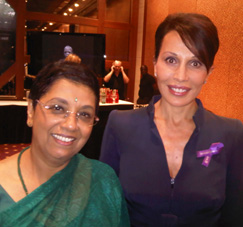Statement
Upholding the Rights of Widows
23 June 2011
Statement
23 June 2011
I am honoured to take part in this landmark Conference for International Widow’s Day, hosted by the Government of Gabon and UN Women.
I wore the brightest color in my cupboard today to celebrate this day and in honor of the widows who were denied wearing such colors for all their lives not so long ago in my own country, India. My father was brought up by his uneducated, widowed mother from the age of 3 and I have seen personally the tremendous hardships faced by widows and their admirable fortitude.

We have come a long way since the days of sati in India, when women were burned alive, either voluntarily or through the use of force or coercion, over their husband’s funeral pyre.
But widows still face persistent discrimination and abuse, including sexual abuse, forced labour and destitution, and we are here to raise awareness to right the wrongs committed against widows.
I have one main message: widow’s rights are women’s rights are human rights. Ignoring the needs and concerns of widows around the world is ignoring a violation of the basic human rights of the most neglected of women.
When widows are denied the right to access, own, control or inherit property and the land they live on, it is a violation of their rights.
When these women and their children are evicted from their homes because their husbands have died, it is a violation of their rights.
When a lack of savings means a lack of health care for themselves and education for their children and grandchildren, it is a violation of their rights.
Widows who are forced into exploitative and risky sex work in order to support themselves and their families are bearing a burden that is unfair and unjust.
And enduring traditional practices directed at widows, which are inhumane and degrading, is a serious violation of their human rights.
Together we must promote gender equality to erase the challenges faced by widows. For as long as daughters face discrimination and are devalued – especially in the context of poor families with limited choices – simply outlawing harmful practices against widows will not solve the problem. Practices and behaviors will only change when girls’ and women’s rights are respected and upheld.
UNFPA joins hands with UN Women to support women’s empowerment programs and to end violence against women.
UNFPA advocates for legislative reform and the enforcement of laws to promote and protect women’s rights – including widows’ rights – to reproductive health choices and informed consent.
Empowering women means ensuring that protective laws exist, but even more so, educating them and their communities about these laws, regulations and policies that affect their rights and responsibilities in family life.
UNFPA also advocates for the rights of the world’s 600 million adolescent girls, many of whom are married off too early, often to men who are much older and will often be widowed early.
Addressing the needs and concerns of widows requires the effort of everyone here today. I now have the honour to draw your attention to key recommendations for governments, civil society and the UN system.
Governments must uphold their obligation of protecting the human rights of widows.
National policies and programs must integrate widowhood into current development plans and strategies, including the standards set by the Committee on the Elimination of Discrimination against Women and the Convention of the Rights of the Child.
Governments must establish national laws, especially those that protect the property and inheritance rights of women and ensure implementation of those laws; strengthen the judicial system; and empower widows to be recognized as full members of society.
Civil society can help keep governments accountable, and be strong advocates for the rights of widows, and service providers to women and girls who have nowhere else to turn.
Finally, UN sister agencies must collaborate with each other and our partners to ensure efforts are creating concrete results in partnership with UN Women.
All of us must work together to collect data on the situation of widows around the world to shine light on their situation and better address their grievances and concerns.
All of us need to support their participation in decision-making processes.
I commend the United Nations High Commissioner for Human Rights for declaring the determination of her office to address human rights violations suffered by widows within the family.
It is our collective responsibility, as the international community, leaders, and women and men to safeguard the rights and dignity of widows.
Together we must stand up to ensure that our sisters, mothers and daughters who have suffered the loss of their husbands, do not also suffer the loss of their rights.
I thank you.